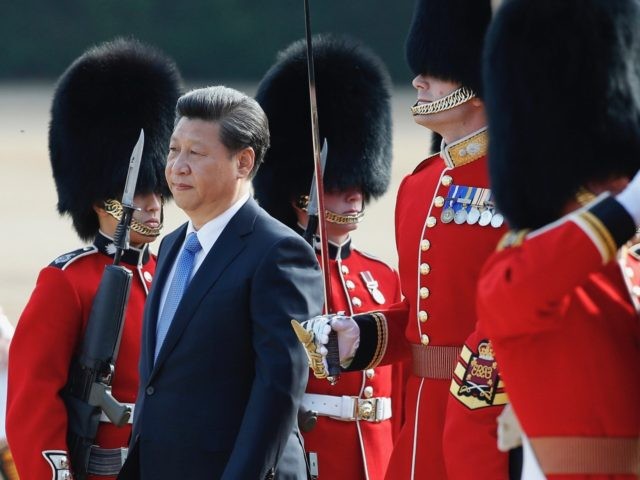Boris Johnson Pushes Back Against China’s ‘Chokehold’ on Barbados Through its Debt Trap Diplomacy
Prime Minister Boris Johnson has reportedly ordered British diplomats to try to counter the “expansionism” of the Chinese Communist Party’s (CCP) Belt and Road initiative following accusations that the regime in Beijing pressured Barbados to remove the Queen as its head of state.
Mr Johnson is said to be concerned that the Chinese state is trying to take advantage of the economic devastation caused by the Wuhan coronavirus in order to gain more influence over other countries. The prime minister will also demand that the secretive CCP be more “transparent” in its financial endeavours abroad.
A source inside Number 10 Downing Street told The Mail on Sunday: “As coronavirus devastates developing countries, many are finding themselves in a Chinese chokehold as a result of the huge debts they owe.”
“The Belt and Road Initiative is an expansionist Chinese Marshall Plan – for instance Beijing is funding a high speed rail line in Laos which is costing the equivalent of more than a quarter of the country’s GDP.
“China is doing this in the least transparent way – providing high-interest and unsustainable loans collateralised against countries’ natural resources. They are in danger of being forced to sell out future generations to meet their present debts.”
The source added that as a member of the G20 and the United Nations Security Council, China needs to fulfil its international obligations and “end its chronic lack of transparency”.
UK Lawmaker Blames Chinese Influence as Barbados Prepares to Remove Queen as Head of State https://t.co/ZizA6o9dXG
— Breitbart London (@BreitbartLondon) September 23, 2020
Last week, the head of Parliament’s foreign affairs committee, Conservative MP Tom Tugendhat, accused Beijing of using debt-trap diplomacy to influence the British Commonwealth nation of Barbados to remove Queen Elizabeth II as its head of state.
The accusations from Tugendhat were allegedly backed up by CIA intelligence shared with the UK, which reportedly showed the CCP efforts to pressure the government in Barbados to cut ties with Britain.
“Barbados may be the latest trophy in Beijing’s imperial string of pearls…the Great Game has given way to the Great Gamble as countries are taking loans from Chinese state banks and betting they can pay them back before the default clauses come due,” Tugendhat wrote on Sunday.
He argued that Chinese foreign investment is not “about development, it’s about domination.”
“China is attempting what the Soviets failed to achieve with guerrillas and revolutionaries. They’re trying to rewrite the global operating system. And they’re succeeding. International co-operation from trade to technology doesn’t just happen, it’s organised,” Tugendhat warned.
China Claims Boris Johnson Has Committed to Xi’s ‘Belt and Road’ Global Commerce Project https://t.co/kj478U3PL0
— Breitbart London (@BreitbartLondon) February 19, 2020
Earlier this month, Barbados Labour Party (BLP) Prime Minister Mia Mottley announced the government’s intention to transition from a Commonwealth constitutional government to a republic, saying: “the time has come to fully leave our colonial past behind… Barbadians want a Barbadian Head of State.”
In 2019, the Chinese Communist Party announced in its propaganda mouthpiece Belt and Road News that Prime Minister Mottley directed her government to “pursue an agreement” to become part of the Belt and Road initiative. Barbados has become one of the Caribbean countries to allow Chinese telecom giant Huawei to build its 5G networks.
On Saturday the Chinese Embassy in London said in a statement: “China is committed to developing relations with other countries on the basis of mutual respect and non-interference. It is definitely not China’s tradition to interfere in others’ domestic affairs, nor are we interest or willing to do so.”
“In recent years, China-Barbados relations have maintained a sound momentum of development as evidenced by steady high-level exchanges and deepening friendly cooperation. Barbados signed cooperation documents on jointly building the Belt and Road Initiative with the Chinese side in 2019. This not only added new connotations to bilateral friendly relations, but also opened up new prospects for mutually beneficial cooperation between the two countries. Our cooperation is equal-footed and mutually beneficial,” the statement added.
Despite the increased tensions between the UK and China, it was revealed that last year the British taxpayer spent £67.8 million in foreign aid directed towards development projects in China, up from £55.6 million in 2018.
The projects included £200,000 to help Chinese economic development, almost £500,000 to supposedly push for human rights and democratic reforms in China, as well as projects to reduce air pollution in Beijing.
A UK spokesman said: “We ended our traditional bilateral aid programme to China in 2011 and now offer the country expertise and skills to help tackle global issues like climate change, which is firmly in the UK national interest.”
Chinese Tech Company Surveilled the Queen, Boris Johnson, and Top Military and Business Leaders: Report https://t.co/ROm4gA7Uov
— Breitbart London (@BreitbartLondon) September 15, 2020
Source: Breitbart







